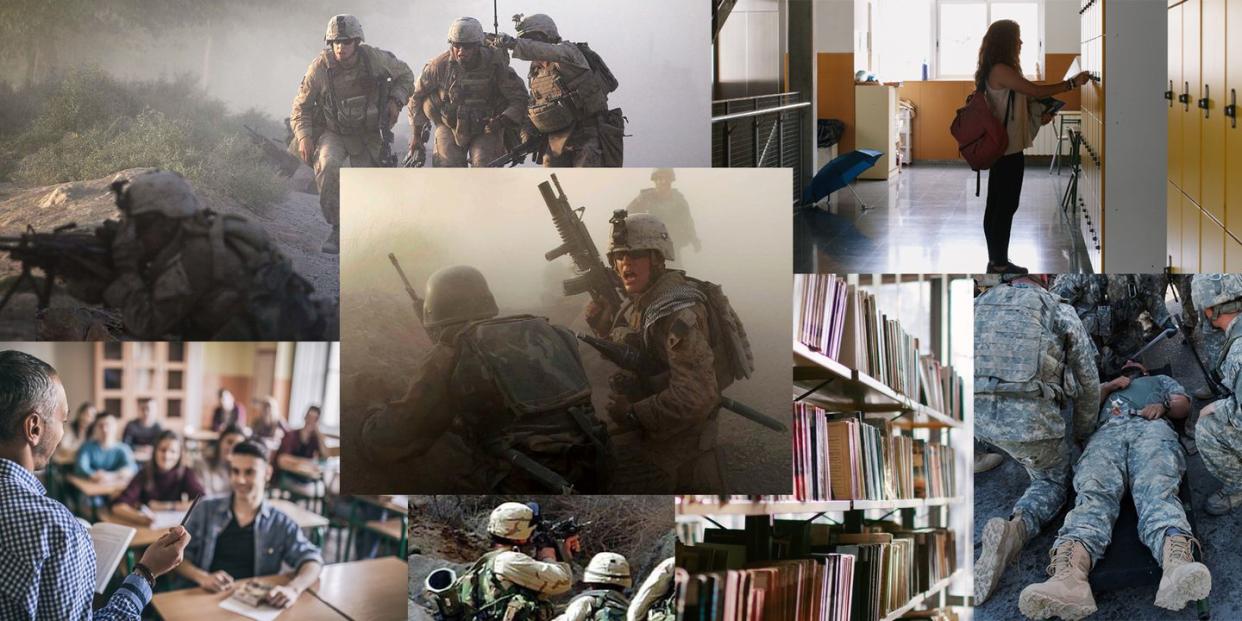Three Veterans Talk About Arming Teachers

One day after President Trump suggested arming America's teachers to prevent school shootings, Scot Peterson, a sheriff's deputy assigned to Marjory Stoneman Douglas High School, resigned amid an investigation into why he neglected to enter the building during the deadly rampage or engage with the shooter.
Critics seized on Peterson's failure to act. The left held it up as evidence that armed guards won't prevent shootings, while people on the right - including President Trump - used Peterson as a scapegoat, the exception that proves the rule. Peterson, according to Trump, either "didn't react properly under pressure or [was] a coward.”
It’s a simple, if reductive explanation, and an easy one for those who’ve never experienced the mental and physical toll of a firefight scenario. But as some with combat experience, like retired General Mark Hertling, the one time commander of the United States Army in Europe, pointed out on Twitter, freezing up in a potential combat scenario, or failing to perform your duty, is not unusual.
“While soldiers/security are trained to run to the sound of the guns...not all do for a variety of psychological reasons. It happens more often than most would think, and it’s part of human nature," he said.
As veterans who’ve experienced combat will tell you, no one ever really knows how he or she will perform in a situation like this until they get there. Acting like a swaggering action hero is not something many people can do, no matter how much they fantasize about it. We asked three veterans to explain what it’s like to react in a high-stress firefight situation. Their answers have been condensed and lightly edited.
Will Fischer, Marines, Iraq, purple heart recipient, director of government relations at Vote Vets

There is an extremely high number of people that have no idea how much time and money the military invest into putting young women and men into a mindset in which they’re maneuvering into danger seamlessly and doing so while maintaining one’s bearing. There was a moment when I was in Iraq when a Humvee, approximately 30 meters in front of me, was hit by a roadside bomb. I ran towards that Humvee that was engulfed in flames, instinctively, because I had done that on ranges and practiced it thousands of times with the people in my unit with whom I served.
A school is not a combat zone. Somebody who is a sheriff’s deputy at a high school, a security officer, are they running ranges every day? Is he proficient with a firearm? There is a difference between being proficient with a firearm and someone who is in the mindset in which they are ready to engage at all times. Which takes us right to the heart of this idiocy of this proposal to arm teachers.
People don't come back from patrol in Afghanistan and grade papers. Are we going to be asking teachers to act out scenarios when they're clearing rooms with fellow teachers, stacking on a door? Is that what we’re expecting of teachers?
Beyond the training one is doing physically, I think it’s always important to remember the training and the great lengths the military goes to to get someone in a mental position to engage someone. We talk all the time about how teachers are dealing with things on a day-to-day basis that require extra levels of empathy. You know what requires no empathy? Shooting another human being. We’d be forcing teachers to go to great lengths to dehumanize their own students.
Ryan Sparks, Marines, infantry officer, Iraq and Afghanistan
What it comes down to is that nobody knows how they will react until they get there. It’s like anything else, you hear the stories about how visualizing the perfect free throw is more important than going out and doing it. It’s the same type of thing. You have to continuously keep yourself mentally ready when you're in that role.
Preparing for potentially killing or being killed? It’s a lifetime of small decisions. You get there in in instant. The second you decide that’s your job you've made the decision to do that. Behind that it’s just the commitment.
In the Marines I was never in a unit of less than three or four people. You have a commitment to them and to yourself. Like anything, when you have a group you have an internal support structure you might be able to use to overcome fear. That’s very different about police work in general, they're often alone.
You can’t train teachers to become FBI hostage rescue level qualified. However, if every teacher has a gun, or at least that’s the perception, and schools are harder for this to happen in it creates a psychological barrier and makes some of these things non events.
Stuart Wexler, Army first lieutenant, Iraq

I was under fire twice in Baghdad, and had to deal with an IED situation there. It’s sort of a fight in your head between your training and your instincts to stay alive, and the more training you have it’s probably easier to overcome your instincts.
I can think of one situation that happened at night in an alley when things weren’t expected to occur. Some guys dove under the truck, some immediately took a cover position. It doesn’t go the way you think it’s going to go. It’s incredible the amount of flight mechanism that is driving your body when you have an immediately physical reaction.
What happens to you in combat is very similar, I think, to what people have as the stereotype of a PTSD episode. Your body sweats, your vision starts to narrow. You basically have to rely on your training. You're either going to run away completely or eventually your training is going to kick in.
The power of companionship and knowing you owe your life to your buddy next to you and that they’d do the same for you is really powerful. So is the power of leaders. As an officer you have to convince guys to do things that are not in their best interest in terms of their own safety. But you have to first overcome your own capacities or limitations. Peterson was all alone. If he had a partner I think the chances that both of them would go in would've been greater than one guy having to overcome that in his own.
The thing is, you also have your general duty: to the mission, to your country, to your fellow soldiers, so there are a whole bunch of things competing for control of your mind and body at the same time. The flight mechanism is probably the greatest because that’s how we evolved and it’s hardwired into our brain. The training and duty to others has to be strong enough to overcome that.
You Might Also Like

